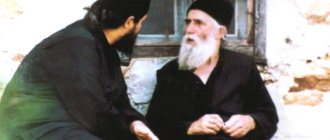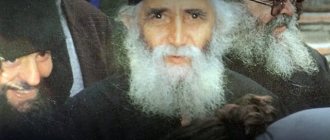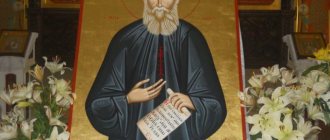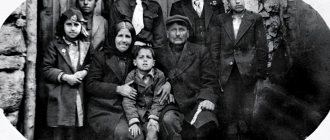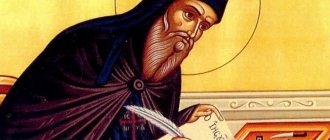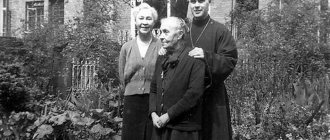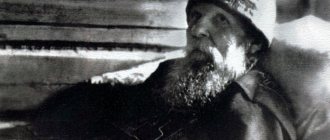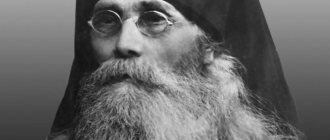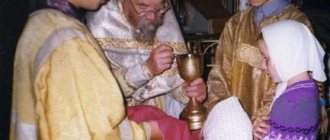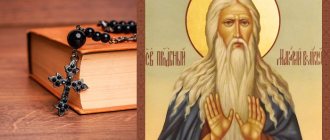Paisius the Svyatogorets, canonized as a saint, whose books are extremely popular in the Orthodox world, was an ordinary monk-carpenter. However, the simplicity and wisdom of his teachings make even the most callous person think about the afterlife. During the life of the elder, pilgrims from all over the world came to Athos to talk about painful issues or even just to see the famous monk.
Biography of Paisius of Athos
The future elder was born in 1924 in Cappadocia, the baby was baptized by Saint Arsenius of Cappadocia, calling the boy his name. Soon, little Arseny's family was forced to flee to Greece due to brutal Turkish persecution aimed at the indigenous Greek population. From a young age, the boy had a great desire for monastic life.
However, this desire was not fulfilled immediately; the young man trained as a carpenter, and then served for several years as a radio operator during the civil war in Greece.
Finally, in 1950, Arseny went to Mount Athos, where he subsequently became a monk with the name Paisiy. Since 1978, the elder has settled in a secluded cell of the Athos monastery of Kutlumush, which has become a center of pilgrimage for people from all over the world. A year before his death, Father Paisius moved to the monastery of the city of Suroti. Here, after a serious illness, the elder passed on to another life, leaving behind hundreds of soul-helping instructions, recorded from his words by the spiritual children of the monk.
The Elder's Prophecies
Among the legacy of Father Paisius one can highlight prophetic visions about the destinies of certain countries and peoples. Thus, the monk spoke a lot about the future of Turkey and Greece.
One of the most famous prophecies of the saint is the capture of Constantinople by the Russians and its transfer to the Greeks, the resumption of Orthodox services in the Church of Hagia Sophia.
Father Paisiy also spoke about the disintegration of Turkey into several parts and the conversion of some Turks to Christianity. The elder predicted the collapse of the USSR to one of the visitors, which happened some time later.
Spiritual heritage
The elder himself, out of humility, did not write down any of his teachings, except for his letters addressed to monks and laity. Many of those who encountered the monk considered it their duty to describe the conversation in detail and hung on his every word. The inhabitants of the monastery where Father Paisius lived in recent years recorded the saint’s sayings on paper and then using a voice recorder. Many pieces of advice and teachings were passed on from mouth to mouth and became family traditions.
Despite the fact that the elder addressed spiritual instructions most often to his native people - the Greeks, he is a beloved and often quoted saint in Russia and the CIS. The saint's conversations contain simple examples from life, parables and humor, which makes them understandable and attractive to anyone interested in Christian doctrine.
Books by Paisius the Holy Mountain
Orthodox books Recommended (collections) Popular authors Paisiy SvyatogoretsSelect subsection:
Words
(1924 – 1994)
The words, teachings, and books of Elder Paisius the Holy Mountain are always popular among Orthodox readers. We offer to order and buy them with delivery at low prices.
When we talk about famous modern Christian ascetics, ascetics of Orthodoxy, the name of the Greek elder Paisius the Holy Mountain, known for his spiritual instructions and ascetic life, immediately comes to mind for almost every Orthodox Christian. And indeed, the contribution of the great elder to the cause of Christian enlightenment and edification of both the people of Greece and the believers of other countries is difficult to describe. He brought many people to Christ both in word and deed, helped many in their needs, but most importantly, he showed all his contemporaries (and above all skeptical people) that asceticism in Christ and salvation in the modern world is quite possible to do yourself , with his high sacrificial life, he showed this, and with his spiritual labors he captured his spiritual experience for posterity.
Arseny (this was the worldly name of Paisiya) was born in 1924 in Cappadocia. Soon his family moved to live in Konitsa (Epirus region). Here the future great ascetic Arseny studied at school and then became a carpenter. Thus, he did not receive a special theological education or even a higher secular one, but he was educated in Christ, and through his godly life he acquired the gift of communication with God and the grace-filled word, which powerfully and beneficially affects human souls, healing, strengthening and revitalizing them.
In 1945, Arseny went to serve in the army by conscription, and in 1950 he went to Athos, where he was a novice for several years. In 1954, Arseny accepted the ryassophore and labored in the monastery of Philotheus under the guidance of Father Simeon. In 1956, Father Simeon tonsured him into the minor schema with the name Paisius.
In 1958, from the village of Stomio (also in Epirus), Paisius was asked to come and help stop the spread of Protestantism in their territory. Saint Paisius the Svyatogorets granted this request and lived there for several years in the Nativity of the Theotokos Monastery. Then he went to Sinai, but soon, in 1964, he came to Athos again and began to asceticize first in the Iveron monastery, and then in the Kutlumush monastery. Thousands of people came here to him for advice and prayerful support.
In 1993, Father Paisios finally left Athos and settled in the monastery of the Holy Apostle John the Theologian in the village of Suroti, where he died on July 12, 1994 and was buried.
Today, the words and spiritual instructions of Elder Paisius are published both in the form of separate books and brochures, and in the form of a collection of works in several volumes. They enjoy constant popularity and authority among the Orthodox audience. In particular, discussing the phenomenon and value of modern culture, the author notes that the presence of many conveniences gives rise, and, moreover, inevitably gives rise to many problems associated with “apparent” conveniences, which, if they do not completely devalue them, then in any case make our life is much more complicated and confusing, and this, in turn, greatly complicates our progress along the spiritual ladder of virtues and prevents us from inheriting the Kingdom of God, for, as Paisius notes, “much care removes a person from God.” The elder also draws attention to such pressing problems of our society as shamelessness in almost everything and disrespect for each other, and internal disorder, the disorder of the people of our time. With regret and pain, he states that sin has simply “come into fashion” today and is widespread everywhere. Although only disasters occur from the sins of people and, moreover, constantly.
At the same time, in the books of Elder Paisius the Holy Mountain there is no spirit of despair or pessimism. On the contrary, he is firmly convinced and convinces his readers of this that salvation is still possible today and the fulfillment of one’s calling is the main task of every Christian. Only for this, a Christian needs to awaken spiritually, realize with all his heart the harmfulness of following the spirit and morals of “this age” and delve deeper into his soul, so that, having realized his sinfulness, turn to God with all his might and begin the path of correction and spiritual growth.
In his works, Saint Paisius the Svyatogorets paid much attention to identifying and resolving problems of family life, which is especially valuable in our era, characterized by crisis and discord in the traditional family and family relationships. At the same time, he not only stated the illnesses of the family, but also showed the foundations on which a Christian family stands: the generous love of spouses for each other. He especially emphasized that only patience in difficulties, accompanied by prayer, saves a family from disintegration.
The theme of family and family relationships is deeply explored in the books of St. Paisius of the Svyatogorets. He said that many people came to him with problems of this kind. “He who does not love God and his family does not love anything.” Such words were spoken by Father Paisius in his book “Words”. He argued that intolerance and selfishness break a person's family life and make him unhappy. The theme of family is covered in the five-volume “Words”. “Family Life” is separated into a separate fourth volume. A separate book, “On the Christian Family,” is also devoted to this topic. This is a huge help regardless of age and gender. Both human relationships and family relationships in God are touched upon here. Without the Divine principle it is impossible to build anything good. Likewise, a family cannot be built without mutual love and trust, concessions and self-improvement.
Immeasurable is the sorrow of Saint Paisius for the lost souls of men. It is expressed in the book “With Pain and Love and Modern Man,” which is the first volume in the “Words” collection. But many Christians found peace in these books. Many people took the right path thanks to the work of the Greek ascetic.
The works of Father Paisius Svyatogorets are a huge spiritual heritage. The pages of his books will fill your world with the light and warmth of his soul. They will open the way for you to understand the universe and your place in it. You can buy books by Paisius Svyatogorets in our online store, which is represented by the Blagovest publishing house.
"Words"
All recorded spiritual conversations are systematized and published in six volumes under the general title “Paisiy Svyatogorets “Words”. Each volume is devoted to a specific problem and topic. The language of the books is simple, lively, filled with vivid images. The translator of the publication, Hieromonk Dorimedont (Sukhinin), tried to accurately convey the soft, colorful speech of the elder.
Books included in the six-volume “Words”:
- “With pain and love about modern man.”
- "Spiritual Awakening"
- "Spiritual struggle."
- "Family life".
- "Passion and Virtues".
- "About prayer."
“With pain and love about modern man”
The first volume of “Words” is divided into four parts, each of which is devoted to a separate problem of spiritual life. The book touches on the topics of sin, modern culture, the difference between the worldly spirit and God's spirit and the Church today.
In this work, the elder convinces Christians to fight their obsession with themselves and their problems. The red thread running through the entire book is the idea of sacrifice as the best way to get closer to God.
"Spiritual Awakening"
The second part contains stories and teachings of the saint on the topic of spiritual courage, asceticism, and man’s dependence on God.
The elder actively uses examples from everyday life and science, urging people to look for spiritual benefits and reasons to think in every situation. It was from the second volume that the Russian-speaking reader began to get acquainted with the book, since this part was translated first.
"Spiritual Struggle"
The third volume teaches the Christian the intricacies of conducting a spiritual struggle with sin and the devil. The topics of repentance and the sacrament of confession, issues of justice and injustice are touched upon here. In conversations, Father Paisius teaches to engage in continuous self-knowledge and self-improvement, insists on the need for humility as a prerequisite for unity with God.
"Family life"
The title of the fourth book speaks for itself. Here are collected the teachings of the elder on the topic of choosing spouses, necessary virtues in family life, and raising children. The text contains simple and effective tips for establishing relationships in a Christian family, and reveals the responsibilities of children and parents towards each other.
"Passion and Virtues"
The fifth volume is divided into two parts, one of which reveals the essence of human sins and passions, and the other tells about the virtues opposite to them. Particular attention is paid to such passions as pride, condemnation, envy, and people-pleasing.
"About Prayer"
The subtleties of prayer practice both at home and during worship are described in the last book in the series. The elder equates prayer with a weapon with which a Christian must protect the soul from the invasion of external negative influences and sinful passions. The monk emphasizes the need for prayer of gratitude to God.
"Stories and Parables"
It is difficult to imagine Father Paisius’s conversations without the fascinating stories and parables that the elder accumulated throughout his life, communicating with hundreds of monks and laymen. After the release of the “Words” of the saint in Russian, which the reader loved, some publishing houses decided to publish a series of brochures consisting of the saint’s parables on various topics.
This series includes:
- "Paterikon of Elder Paisius."
- "About life, people and Divine justice."
- “About family and raising children.”
- “Elder Paisios is joking.”
For each story, the compilers came up with a title to make searching more convenient. Reading the bright parables of the saint will be interesting not only for Orthodox Christians, but also for all believers.
"Spiritual Alphabet"
One of the most popular and sought-after books of the saint is “The Spiritual Alphabet” by Elder Paisius the Holy Mountain. The teachings collected in the publication are simple and accessible, but at the same time filled with deep spiritual meaning. Like other collections of the elder’s speeches, “The Spiritual Alphabet” is compiled in the form of answers to questions.
The peculiarity of this book is that excerpts from the monk’s conversations are arranged in alphabetical order.
For example, under the letter A there are excerpts from the teachings of Father Paisius on the topic of abortion, apostasy, and asceticism. This work is convenient because you can quickly find an answer to a specific question.
In addition to the publications listed above, there are other books with the elder’s teachings. For example, a collection of letters to spiritual children under the same name “Letters”, a brochure “On Death and the Future Life”.
You can also note the lives of Saint Arsenius of Cappadocia and Elder Hadji George, written by the Monk Paisius himself. These biographies were translated and published by the Holy Mountain publishing house of the Trinity Lavra of St. Sergius.
Paisiy Svyatogorets,
Paisios Svyatorets (Arsenios Eznepidis) was born in the Greek village of Farasy (Capadocia) in 1924 on July 25. He was baptized by Saint Arseny of Cappadocia, who gave the boy the name Arseny and with the words “I want to leave behind me a monk,” he predicted the future.
In the year of his birth, a population exchange took place between Greece and Turkey. Together with other refugees, the family of the future saint sailed to Greece. The boy grew up and graduated from school in the city of Konitsa, where he also learned to be a carpenter.
Since childhood, dreaming of becoming a monk, Father Paisius often went into the forest to pray.
In the year of the victory over Nazi Germany, he was drafted into the army as a radio operator, after which he had to take care of his sisters. Only five years later, Arseny was able to leave for Athos. Father Kirill, later abbot of the Kutlumush monastery, became his confessor,
In 1954, Arseny was tonsured with the name Averky as a ryassophore at the monastery of Esfiigmen, where he was sent by his spiritual teacher.
Philotheus Averky moved to the monastery after being tonsured, having found a new mentor - Father Simeon. Two years later, the future saint was tonsured into the minor schema and was named in honor of Paisius II, Metropolitan of Caesarea, also a native of the village of Farasy.
Paisiy did not disdain any kind of obedience and, as soon as he finished, he tried to help the brothers.
The ascetic left Athos in 1958 at the request of help from Stomio Konitskaya, where it was necessary to stop the spread of Protestants.
After living for four years in Stomio, in the Monastery of the Nativity of the Virgin Mary, Father Paisios went to Sinai in 1962. Two years later he returned to Athos, to the Iveron monastery. Due to a serious illness in 1966, most of his lungs were cut out, but the elder continued to actively serve. In the seventies, he organized a mission in the Congo, as a result of which fifty-five parishes were opened and more than one and a half thousand local aborigines were baptized.
In 1993, illness began to overcome the monk, he had to leave Athos and spend the rest of his days in the St. John the Theological Convent near Thessaloniki.
On July 12, 1994, the soul of Saint Paisius departed to the Lord. The Temple of Arseny of Cappadocia, behind whose altar the great ascetic is buried, has become a place of pilgrimage for a huge number of Christians from all over the world.
The elder left behind many soul-helping teachings that do not lose their relevance.
Paisius the Svyatogorets was canonized as a saint by the Constantinople and Russian Orthodox churches in 2015.

